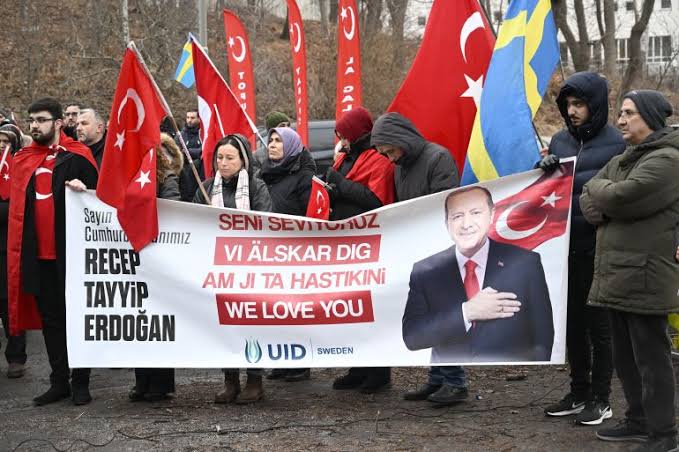Following demonstrations in front of its embassy in Stockholm that included the burning of a Quran by far-right sympathizers and a separate rally by Kurdish activists, Turkey chastised Sweden.
A visit by Sweden’s defense minister was postponed, according to Ankara, in order to assuage Turkey’s concerns about joining NATO. In order to join the military alliance, Sweden needs Turkey’s support as concerns in Europe increase in the wake of Russia’s invasion of Ukraine.
Rasmus Paludan, the head of the Danish far-right political group Hard Line, burned the Quran. During the Muslim holy month of Ramadan, Paludan’s announcement of a Quran burning “tour” in April of last year caused riots throughout Sweden.
Paludan, surrounded by police, denounced Islam and immigration in Sweden during a nearly hour-long tirade before setting fire to the holy book with a lighter. Nearby, about 100 people gathered for a calm counterprotest.
“You have to live somewhere else if you don’t think there should be freedom of expression,” he remarked.
The Turkish foreign ministry issued a statement in response right away.
“We denounce the heinous assault on our holy book in the strongest terms possible… Under the cover of freedom of expression, tolerating an anti-Islam conduct that targets Muslims and denigrates our cherished beliefs is wholly unacceptable, the ministry declared.
Mevlut Cavusoglu, the foreign minister of Turkey, lashed out at the Swedish government for not forbidding the protest. It’s not about freedom of expression, he continued, “it’s a discriminatory activity.”
Several Arab nations, notably Saudi Arabia, Jordan, and Kuwait, condemned the burning of the Quran.
The Saudi foreign ministry issued a statement saying, “Saudi Arabia calls for spreading the ideals of discourse, tolerance, and coexistence and rejects intolerance and extremism.
To condemn the Quran-burning, a tiny group gathered in front of the Swedish embassy in Ankara. On Saturday night, there was also supposed to be a protest in Istanbul.
Tobias Billstrom, the foreign minister of Sweden, referred to the provocations as “appalling.”
Billstrom wrote on Twitter, “Sweden has a broad freedom of expression, but that does not indicate that the Swedish Government or I support the beliefs expressed.
Separate demonstrations in support of Kurds and against Sweden’s NATO membership took place in the city. Pro-Turkish protesters also held a rally in front of the embassy. Each of the three occasions had a police permit.
The Kurdistan Workers’ Party, also known as the PKK, which has been fighting a long-running insurgency against Turkey, was among the Kurdish parties whose flags were hoisted during the demonstrations. Although the PKK is regarded as a terrorist organization in Turkey, the European Union, and the US, Sweden does not have a ban on its insignia.
As a result of ongoing hostilities stemming from Ankara’s opposition to Sweden’s application to join the NATO military alliance, Turkey was earlier incensed by Sweden’s approval of the protest in front of its embassy.
Turkish Defense Minister Hulusi Akar criticized the Swedish government for doing little to stop “disgusting” anti-Turkish demonstrations on Swedish land. According to Akar, the visit by his Swedish counterpart Pl Jonson slated for January 27 no longer has “any meaning or point.”
Ibrahim Kalin, a spokesperson for the Turkish president, denounced the demonstration as a “manifest crime of hatred.”
He tweeted, “Allowing this action despite all our warnings is fostering Islamophobia and hate crimes.” “Modern barbarism, not freedom, is the assault on fundamental principles.”
Billström stated on Friday that Sweden respects the right to free expression.
Despite the difficulties, Carl Bildt, a former Swedish prime minister, told Al Jazeera that there was still work being made on the issue of Turkey’s acceptance for Sweden’s accession to NATO.
Extremists and lunatics are prowling the area and attempting to obstruct the entire procedure. If the authorities in Ankara are actually interested in reaching an agreement, they shouldn’t be given [priority],” stated Bildt.
On Friday, Turkey summoned Sweden’s ambassador to express its condemnation of the demonstrations, claiming that such gatherings would violate the joint pact between Turkey, Sweden, and Finland, which prevented a Turkish veto for the Nordic nations’ NATO membership in June.
When Sweden and its neighboring Finland asked to join the Western defense alliance last year in reaction to Russia’s invasion of Ukraine, they ended decades of military non-alignment.
Their applications, which require approval from all member nations, have so far been rejected by Turkey, which has conditionally supported Sweden’s extradition of individuals it holds responsible for acts of terrorism or complicity in the failed 2016 putsch against President Recep Tayyip Erdogan.
Sweden, according to Turkey, is not doing enough to repress Kurdish organizations that Ankara labels as “terrorists.”
In response to a video broadcast by a Kurdish organization in Stockholm showing an effigy of Erdogan swinging by his legs from a rope, Sweden’s ambassador to Turkey was called last week.





